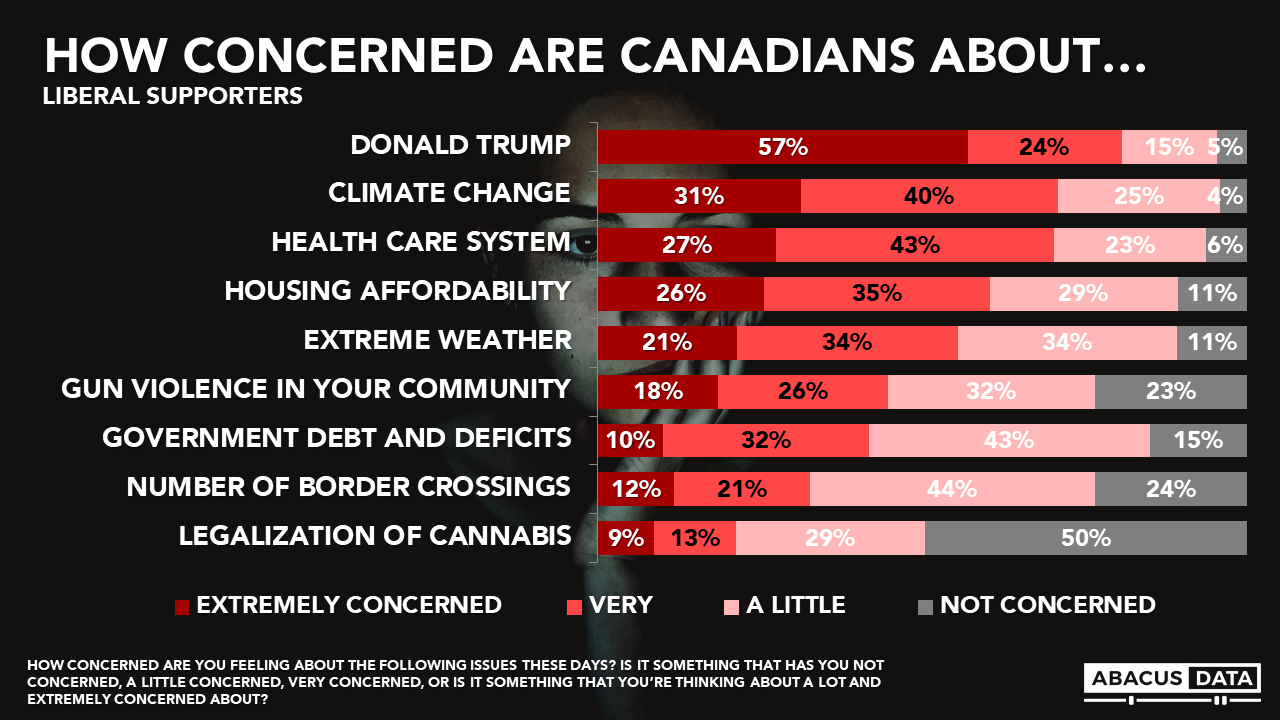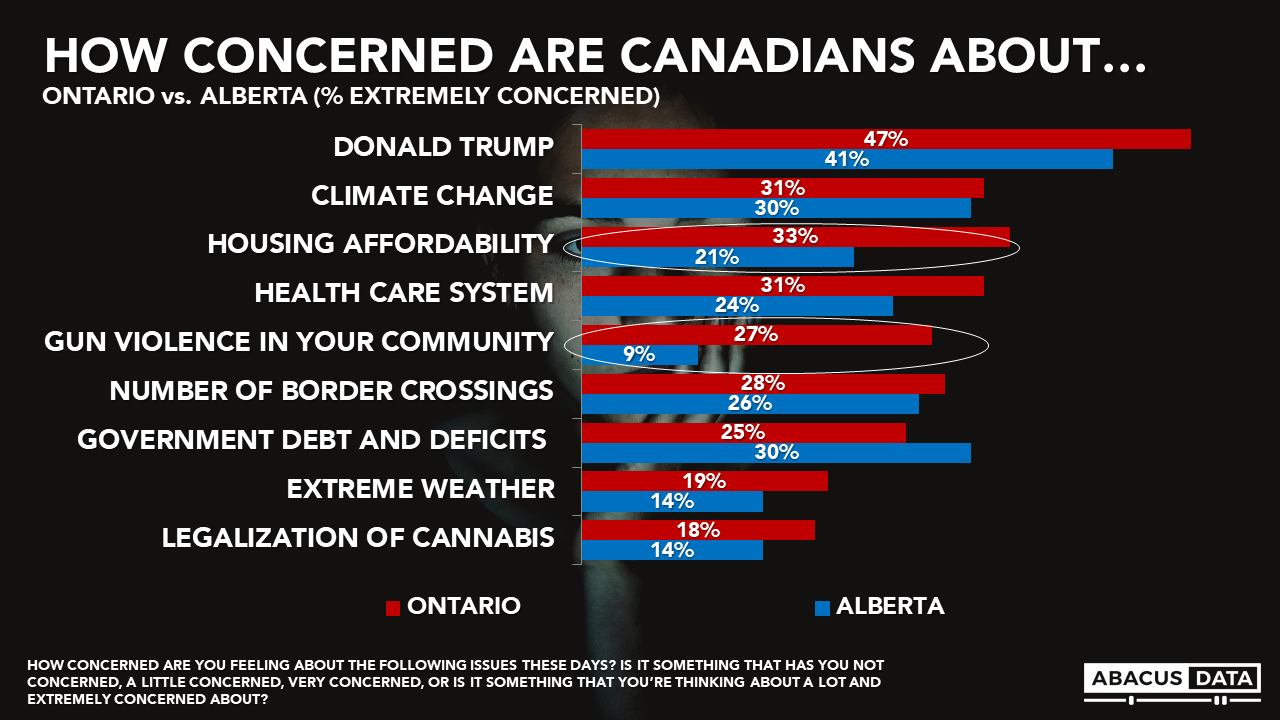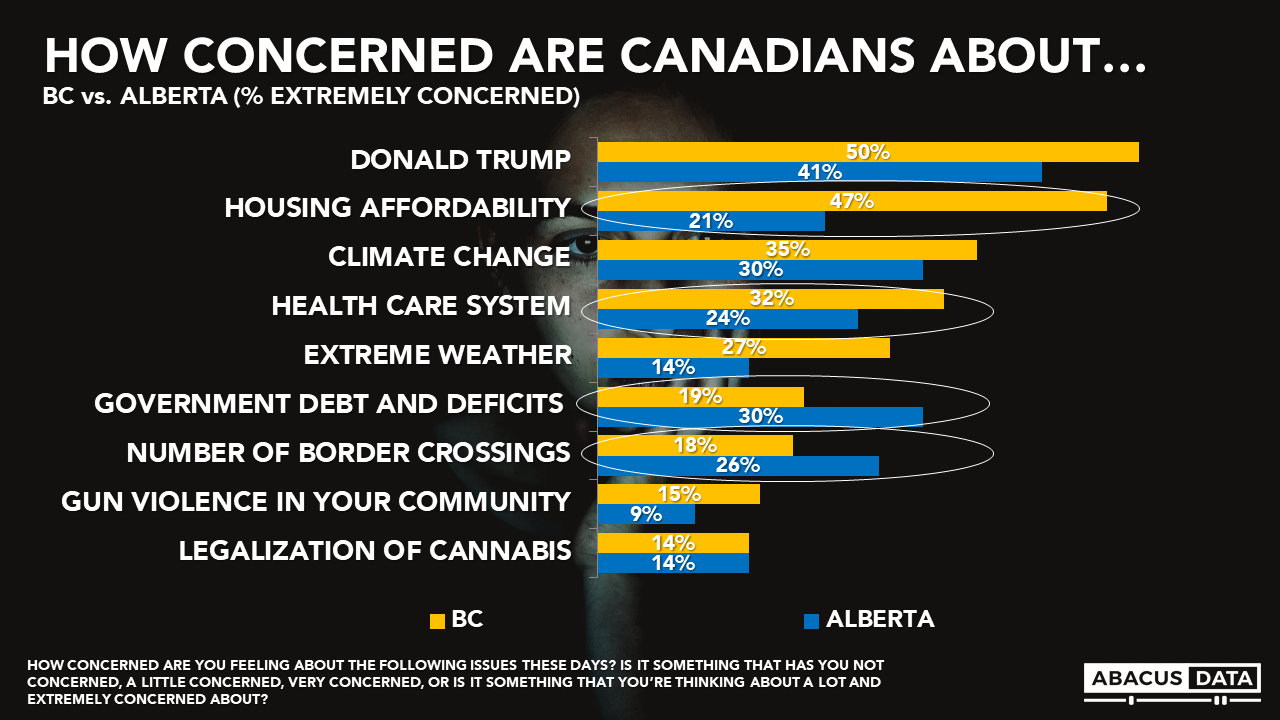2019 race may feature many issues: From climate change, debt & housing, to borders and gun violence and, always, Trump.
August 24, 2018
We are about a year away from the start of the 2019 federal election. Last week, we polled 1,500 Canadian adults on how they are seeing their political choices and the issues that they are most concerned about.
Here are the highlights as we see them:
Our latest polling on the national political mood shows the Liberal Party would win 37% support if a vote were held now, followed by the Conservatives at 33% and the NDP with 18%. This is largely unchanged from last month and mimics the numbers we found in March.

Regionally, we see a significant lead for the Liberals in Quebec, and a dead heat in Ontario, the two provinces that combined will choose 199 of the 338 Members of Parliament next fall. The Conservatives have a big lead in Alberta, while the Liberals continue to do well in BC and Atlantic Canada.

Some 41% say they think the country is on the right track (42% last month), and 44% approve of the performance of the federal government (the same number as last month).

The government enjoys better approval ratings among those aged under 45.

Today, 43% have a positive opinion of Justin Trudeau and 36% have a negative opinion (unchanged from last month). For Andrew Scheer, the sentiment is 26% positive and 25% negative, and for Jagmeet Singh results are 22% positive and 26% negative.



We explored the current level of concern about a variety of topical issues and found that Donald Trump, climate change and health care top the list of 9 items we tested, with gun violence and cannabis legalization ranking 9th and 10th. Housing affordability ranked 4th and the number of border crossings ranked 5th.

For voters under 45, Trump, climate change, and housing affordability are the top three issues while gun violence, border crossing, and cannabis legalization are at the bottom of the list.
For those 45 and over, Donald Trump, the health care system, and housing affordablility are in the top three. Concern about the number of border crossing is higher among these respondents while concern about climate change is somewhat lower.


Among Liberal voters, Trump, climate change and health care top the list, with border crossings, debt, and cannabis at the bottom. Among Conservatives, border crossings and debt are at the top of the list, and climate change is at the bottom.



We also isolated some differences across regions with a focus on those who are extremely concerned about these the issues we tested.
For those living in Canada’s largest cities, gun violence is far more likely to be a concern than those living in other communities. Big city residents are also 5 points more likely to be extremely concerned about housing affordability – although this gap is smaller than some might expect and suggests that housing affordability concerns are not just isolated to Canada’s largest cities.

Big differences also exist between Ontario and Alberta and Alberta and BC, demonstrating the challenge parties will have to appeal to voters in these provinces.
Ontario residents are three times as likely to be extremely concerned about gun violence and twice as likely to be concerned about housing affordability, compared with Albertans.
Despite its shared border, Alberta and BC residents differ in their preoccupations. Housing affordability is a major issue for almost half of BC residents while only 9% of Albertans feel the same. Albertans show comparatively higher concern about government debt and border crossings.


UPSHOT
The race to the 2019 election is starting to take shape and at this point, the Liberals face a highly competitive Conservative Party. Whether Maxime Bernier’s decision to leave the Conservative Party has the potential to undermine the competitiveness of Mr. Scheer’s Tories will be interesting to watch, especially in Quebec, where the Conservative brand had been seeing an uptick in support.
The issue landscape seems unusually crowded and varied heading into the coming election year. In different provinces, by community size, age, and along party lines, a variety of different issues that have the potential to motivate voter support: at this point, there isn’t a single galvanizing and unifying issue.
Without a doubt, Donald Trump continues to dominate the news for Canadian voters and managing that complex relationship will be an important predictor of confidence in the Liberals. We also note that climate change continues to show a heightened level of public concern, no doubt again this year influenced by news of wildfires that continue to burn in much of BC and Northern Ontario. Many voters will expect any candidate seeking their vote to offer ideas about combating climate change.
At this point, the border crossing issue is of much higher concern for Conservative voters than others. Supporters of both other parties, and certainly big city voters under 45, are more likely to be looking for solutions to housing affordability.
METHODOLOGY
Our survey was conducted online with 1,500 Canadians aged 18 and over from August 15 to 20, 2018. A random sample of panelists was invited to complete the survey for a set of partner panels based on the Lucid exchange platform.
The margin of error for a comparable probability-based random sample of the same size is +/- 2.5%, 19 times out of 20. The data were weighted according to census data to ensure that the sample matched Canada’s population according to age, gender, educational attainment, and region. Totals may not add up to 100 due to rounding.




